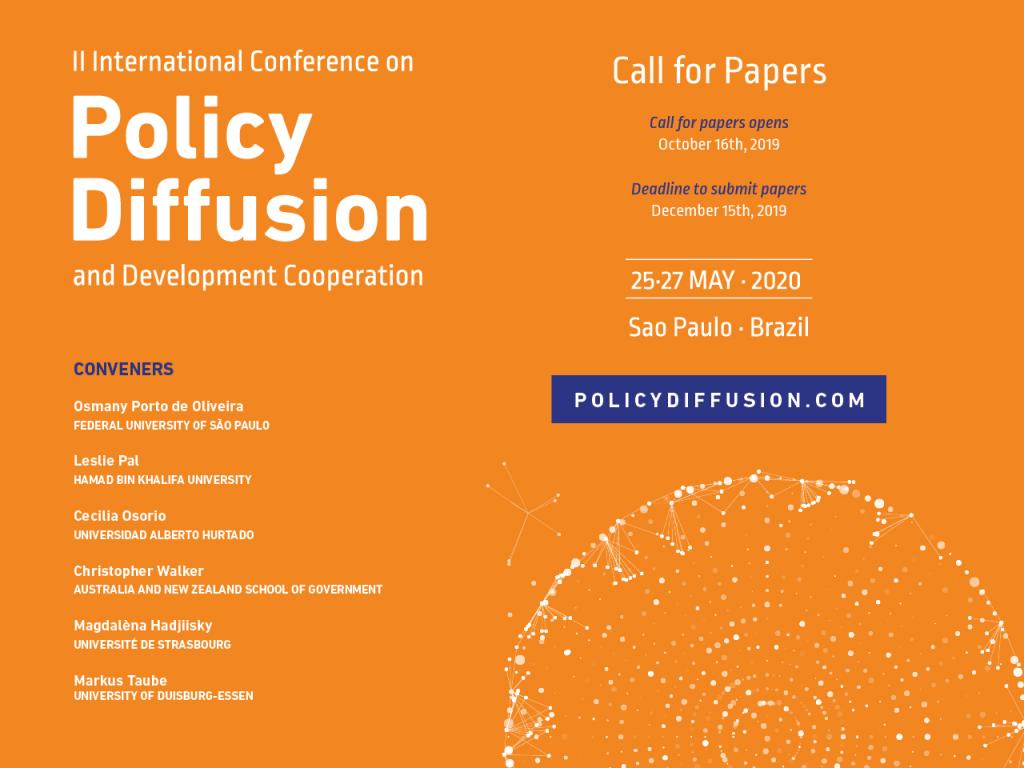Thank you for your message. The IPPA team will get back to you shortly. You first need to login here.



The II International Conference on Policy Diffusion and Development Cooperation is a participatory and collaborative space where both Southern and Northern scholars will discuss issues, concepts and methods to produce knowledge and improve our understanding of policy diffusion and development cooperation. Our first meeting was held in 2016 at the Brazilian Center of Analysis and Planning (Cebrap) as a seminar, and this has become a biannual conference in partnership with the Federal University of São Paulo (Unifesp) and the International Public Policy Laboratory (Laboppi). The conference brings together major experts in political science, sociology, public policy, international relations, urban studies, and geography to discuss how policies travel and governments cooperate. The last edition occurred in 2018 with more than 270 participants from countries all over the world, and we have been building a global network that now unites more than 400 researchers interested in this topic.
General Call for Papers
The fall of the Berlin Wall and the progressive intensity of globalization in the nineties opened up an unprecedented exchange of policy ideas, knowledge and models among governments all over the world. Different research traditions in social sciences followed this empirical movement providing important explanations for these processes. The II International Conference on Policy Diffusion and Development Cooperation is an eclectic global meeting that brings together researchers from all over the world to discuss the various dynamics of these policies in movement.
The literature on the international circulation of public policies (Stone, Porto de Oliveira, & Pal, 2019; Porto de Oliveira & Pimenta de Faria, 2017) informs us that these days such processes occur in many different ways (Hadjiisky, Pal, & Walker, 2017), involving a plethora of agents (Pal, 2012; Stone, 2008), with diverse narratives (Cabral, Shankland, Favareto, & Costa Vaz, 2013), operating in multiple arenas (Baker & Walker, 2019), with unequal power relationships (Dolowitz, Plugaru, and Saurugger 2019), within dynamics of competition and cooperation (Mawdsley, 2017), following different directions (Osorio Gonnet, 2018) and geographies (Milhorance, 2018) in distinct time periods (Peck & Theodore, 2015; Wood, 2015), generating heterogeneous effects including bricolages (Stone, 2017) and translations (Hassenteufel, Benamouzig, Minonzio, & Robelet, 2017). In spite of this mosaic of knowledge produced and accumulated over the past few years, there are still past and present empirical settings, theoretical questions and methodological issues that require deeper study in order to help us to explain these phenomena with greater precision.
Among the most cutting-edge questions in the field are: what is the influence of far-right groups and leaders, as well as the post-truth context of policy transfer? How does state capacity affect policy transfers? In which ways does the geopolitical distribution of power affect the international “policy market”? Which causal mechanisms facilitate or constrain policy diffusion, beyond coercion, learning, competition and emulation? What are the implications of the contemporary changes in South-South cooperation on policy transfers? How can social network analysis improve our understanding of policy circulation? What is the impact of the proliferation of social policy innovation labs on policy transfers? How can regionalisms facilitate or constrain policy diffusion? What is the role of digital technology and internet knowledge hubs, learning communities, and transfer platforms in the circulation of governmental and administration ideas, models and techniques? These are some of the issues that the II International Conferences on Policy Diffusion and Development Cooperation will address.
In this event we expect to move forward and innovate in this debate, producing front-line discussions and new research partnerships. This is a participatory and collaborative space where both Southern and Northern scholars will discuss issues, concepts and methods to produce knowledge and improve our understanding of policy diffusion and development cooperation. Our first meeting was held in 2016 at the Brazilian Center of Analysis and Planning (Cebrap) as a seminar, and this has become a biannual conference in partnership with the Federal University of São Paulo (Unifesp) and the International Public Policy Laboratory (Laboppi). The conference brings together major experts in political science, sociology, public policy, international relations, urban studies, and geography to discuss how policies travel and governments cooperate. The last edition occurred in 2018 with more than 270 participants from countries all over the world, and we have been building a global network that now unites more than 400 researchers interested in this topic.
Deadline to submit proposals: December 15, 2019
References:
Baker, T., & Walker, C. (2019). Public Policy Circulation. Edward Elgar.
Cabral, L., Shankland, A., Favareto, A., & Costa Vaz, A. (2013). Brazil-Africa Agricultural Cooperation Encounters: Drivers, Narratives and Imaginaries of Africa and Development. IDS Bulletin, 44(4), 53–68.
Dolowitz, D. P., Plugaru, R., & Saurugger, S. (2019). The process of transfer: The micro-influences of power, time and learning. Public Policy and Administration, 0952076718822714.
Hadjiisky, M., Pal, L. A., & Walker, C. (2017). Public Policy Transfer: Micro-Dynamics and Macro-Effects. Edward Elgar.
Hassenteufel, P., Benamouzig, D., Minonzio, J., & Robelet, M. (2017). Policy Diffusion and Translation: The Case of Evidence-based Health Agencies in Europe. NOVOS ESTUDOS - CEBRAP, 36(01), 77–96.
Mawdsley, E. (2017). Development geography 1: Cooperation, competition and convergence between ‘North’ and ‘South’. Progress in Human Geography, 41(1), 108–117.
Milhorance, C. (2018). New Geographies of Global Policy-Making: South–South Networks and Rural Development Strategies. 245.
Osorio Gonnet, C. (2018). A Comparative Analysis of the Adoption of Conditional Cash Transfers Programs in Latin America. Journal of Comparative Policy Analysis: Research and Practice, 1–17.
Pal, L. A. (2012). Frontiers of Governance: The OECD and Global Public Management Reform. Palgrave McMillan.
Peck, J., & Theodore, N. (2015). Fast Policy: Experimental Statecraft at the Thresholds of Neoliberalism. University of Minesota Press.
Porto de Oliveira, O., & Pimenta de Faria, C. A. (2017). Research Traditions and the State of the Discipline in Brazil. Novos Estudos - CEBRAP, 36(01), 13–34.
Stone, D. (2008). Global Public Policy, Transnational Policy Communities, and Their Networks. Policy Studies Journal, 36(1), 19–38.
Stone, D. (2017). Understanding the transfer of policy failure: Bricolage, experimentalism and translation. Policy & Politics, 45(1), 55–70.
Stone, D., Porto de Oliveira, O., & Pal, L. A. (2019). Transnational policy transfer: The circulation of ideas, power and development models. Policy and Society, 1–18.
Wood, A. (2015). Multiple Temporalities of Policy Circulation: Gradual, Repetitive and Delayed Processes of BRT Adoption in South African Cities: MULTIPLE TEMPORALITIES OF POLICY CIRCULATION. International Journal of Urban and Regional Research, 39(3), 568–580.


Thank you for your message. The IPPA team will get back to you shortly. You first need to login here.